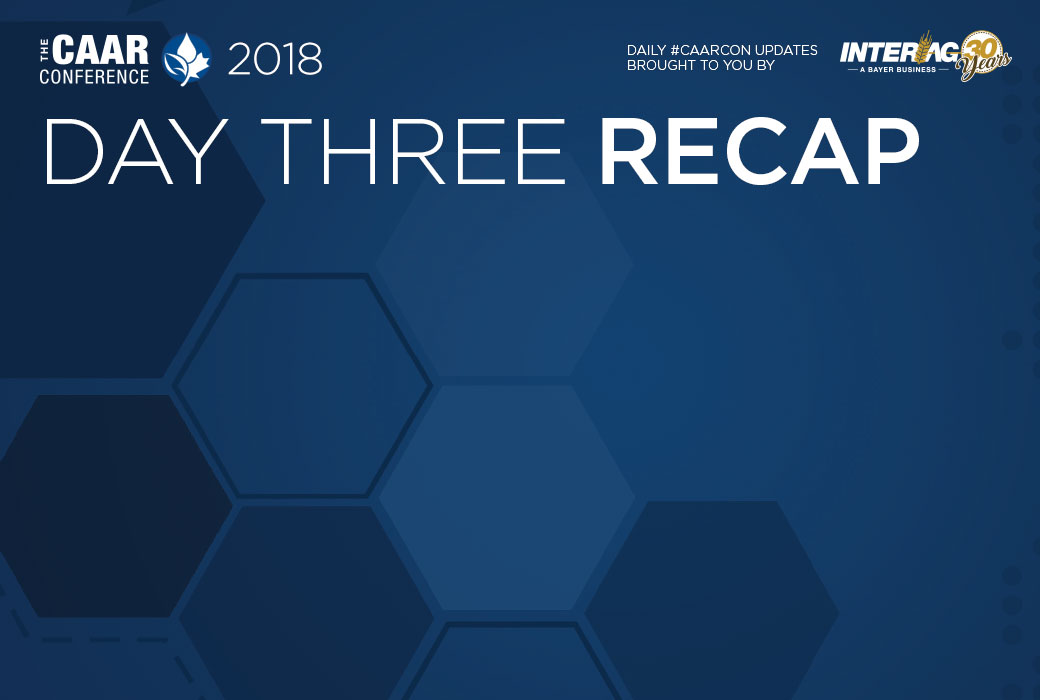This #CAARCON update is brought to you by InterAg.
We’ve reached the end of another CAAR Conference! The final day was full of thought-provoking discussions that left the audience with ideas to ponder long after they’ve returned home.
Possibility Thinking
Sponsored by Farm Credit Canada
During the Possibility Thinking session, Candace Hill and Isaac LeClair from Farm Credit Canada challenged the audience to think about how they market their business, including shifting their focus “from selling to helping,” echoing themes from yesterday’s “Understanding Farmers’ Needs and Expectations” Panel Discussion.
“Marketing and Canadian ag are both changing rapidly. In order to keep up, you may have to do things differently,” says Hill. “Companies that take risks, try new thing and try to connect with their customers in different ways will benefit by showing that they’re willing to take a chance.”
When Hill had sparked the audience’s creativity, the presentation then moved into how to present innovative marketing ideas on social media.
“Social media, when used strategically, can have a snowball effect. Think of it as word of mouth on steroids,” says LeClair. “You don’t want to use social media to tell people about your business. Use social media to get other people to tell people about your business.”
The presentation was a great starting point for the last day of the conference, as the audience was left with many questions to think about and discuss among fellow delegates.
Panel Discussion: Selling the Business of Agronomy
Sponsored by ADAMA
Panelists Aaron Breimer of Veritas Farm Business Management, Dennis Bulani from Rack Petroleum and Remi Schmaltz from Decisive Farming joined moderator Scott Duesing of CF Industries for the Selling the Business of Agronomy panel to kick off the afternoon. Each panelist discusses how they approach agronomy services, including helping growers navigate the plethora of new products available to them, and having their agronomists be more than “just sales people.”
“Back to yesterday’s discussion about being a trusted advisor, if you want to be more than just someone who fills orders, you need to be presenting new technology and products to your clients and educating them on what is available,” says Schmaltz.
Throughout the discussion, more questions about what it really means to be a trusted advisor were addressed, and what that means with customers who are considering using services from competitors like direct-to-farm models.
“If you’re a trusted advisor, in my mind that means you’re on the same team, you’re partners” says Breimer. “And if you’re on the same team that means you have the same competition. But ask yourself – does your partner view it that way? How are we going to overcome that?”
When the discussion came to putting prices on agronomy services, Bulani says it is critical to define the exact parameters of service and emphasize the value you’re providing.
“If you’re offering crop scouting, what does that entail? Does that mean you’re there once a week? Five times a week? Nine times a week?” asks Bulani. “My competitors might be offering a scouting program for $2 an acre, but I don’t believe we can do a good job for $2 an acre.”
Keep your eyes out for the April issue of The Communicator for a full transcription of this educational and practical panel discussion.
Keynote Speaker: Donald Cooper - Accelerate Your Business
Sponsored by Global Ag Risk Solutions
Donald Cooper brought his years of experience as an International Business Coach to the stage as he encouraged retailers to accelerate their business by creating clarity.
Cooper stresses the concept of clear, compelling communications both externally and internally. He says you need to get everyone in your company “singing from the same hymn book.”According to Cooper, there are eight key concepts businesses need to be clear on to build their customer base, and first and foremost, attract and retain talented and qualified people.
“The best people have to work for somebody,” he says. “Ask yourself what defines the kind of company that the best people in your industry want to work for. Then ask yourself, ‘What work do we need to do to make that our company?’”
Cooper says that businesses can create clarity by changing the language they use to describe their business objectives. “Everybody is ‘aiming’ and ‘striving,’” he says. “Don’t strive. Commit.”
This was the concept that stood out as most interesting to audience member Reg Olsen from Olds Fertilizers in Alberta.
“I liked the idea of not being wishy-washy with your projections. Be committed to what you’re doing,” says Olsen. “Changing the language you use can put the wheels on the asphalt, so to speak.”
Cooper’s invigorating key note presentation brought us to the end of the day, and left the crowd feeling energized, motivated and excited to get back to work and keep improving their business. Thank you to all of our speakers, sponsors and exhibitors for making the 2018 CAAR Conference a great success!
CAAR is excited to announce that we will see you all again at the heart of the continent next year for the 2019 CAAR Conference in Winnipeg, Manitoba!
 How to resolve AdBlock issue?
How to resolve AdBlock issue? 


Join the discussion...
You must be logged in as a CAAR member to comment.
Report
My comments